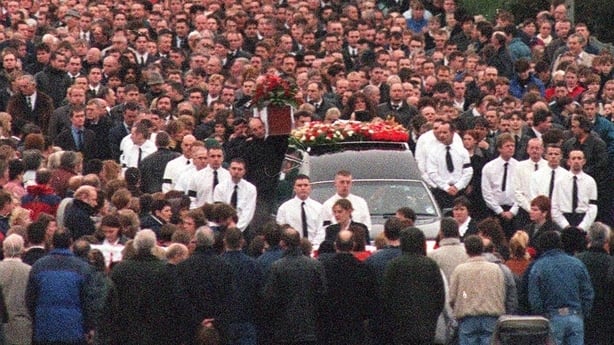By David McCullagh and Fiachra Ó Cionnaith
Irish officials were deeply suspicious of the way Loyalist Volunteer Force leader Billy Wright was treated in prison, with some believing he was being singled out for special treatment to boost his status, according to recently opened State Papers.
Wright, known as 'King Rat', had been a senior member of the UVF in Mid-Ulster, but broke with the organisation over its 1994 ceasefire, later forming the LVF, a ruthless organisation responsible for the deaths of dozens of Catholics.
Early in 1997, he was imprisoned, and the British authorities recognised the LVF as a separate loyalist paramilitary grouping and gave its members a separate wing in the Maze prison.
Irish officials were horrified, arguing that the move would "enhance Wright's self-confidence and self-importance ... [and] provide a magnet for a variety of dissidents amongst Loyalist prisoners and...weaken the authority of the relatively moderate and peace-oriented Combined Loyalist Military Command leadership within the Maze".
Read more:
State Papers cover serious and bizarre topics
US put under pressure over Irish visas ahead of World Cup
Threats to poison English water supplies taken seriously
Six more things we learnt from the State Papers
At the same time as LVF demands for a separate wing were granted, the British authorities were refusing requests from Dublin for concessions to mainstream loyalist prisoners in order to strengthen their ceasefire.
Brendan McAllister of the Mediation Network visited Wright in prison in the summer of 1997 and found him to be "articulate, intelligent and charismatic", attracting the loyalty of his followers through "personal magnetism ... rather than fear".
McAllister believed the threat from the LVF had to be taken seriously, arguing that Wright "combined a potent mix – magnetism and leadership, a sense of purpose, idealism and probity, a cadre of disciplined and motivated followers with a proven capacity for sectarian violence and a philosophy which stridently mixes notions of territory, identity and religious fundamentalism".
"He and his followers see themselves as the custodians of a unionist integrity which has been lost sight of by the mainstream."

After burning their wing in July 1997, the LVF prisoners were subjected to a strict regime, held in solitary confinement, guarded by a specialist unit of prison officers armed with long shields and batons, who wore visors which only revealed their eyes, and communicated in hand signals to avoid identification by prisoners.
McAllister described the wing as "deathly quiet" and found Wright "very angry at this treatment", which he described as an attempt to humiliate him.
However, others thought the treatment actually benefitted the LVF.
Briege Gadd, head of the Northern Ireland Probation Board, felt it was being "done deliberately by elements within the authorities to help establish and nurture the LVF".
She believed it would increase cohesion among the prisoners, and give their supporters on the outside a cause to rally around.
Gadd blamed NIO officials who were "manipulative and malign ... and followed a right-wing and unionist agenda", telling Irish official Eamon McKee that these "malign mandarins" could only be countered at a political level.
McKee told Dublin that Gadd was "but one of a number of contacts with whom I talked about the prison issue who voiced very real fears" about the treatment of the LVF.
He acknowledged that the suggestion that "elements within the establishment are in effect nurturing the LVF may seem fanciful but, given her credentials and her experience with the prison service, her speculation cannot be lightly dismissed. It is, at any rate, a view shared by other paramilitary groups."
British authorities justified the special treatment of the LVF by claiming that Wright's life was in danger.
They were right.
He was killed just after Christmas in 1997 by INLA prisoners who had smuggled a gun into the Maze.
[Based on files in 2024/28/7]

